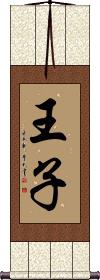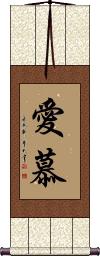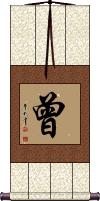Many custom options...
And formats...

Prince in Chinese / Japanese...
Buy a Prince calligraphy wall scroll here!
Personalize your custom “Prince” project by clicking the button next to your favorite “Prince” title below...
Prince
王子 is prince in Chinese characters and Japanese Kanji.
If you look at the meaning of each character, the first means king, and the second means son (or child). Thus, “King's Son,” “Son of the King,” or “King's Child” is the literal meaning of this title.
Nezha
哪吒 is the name Nezha in Chinese (Mandarin).
While it is sometimes used as a given name, Nezha is a protective deity in Taoism, Buddhism, and Chinese folk religion. Also known as the “Marshal of the Central Altar”, “Prince Nezha”, or “Third Prince”.
Romanized variations include Nazha, Nacha, and Necha.
Adoring Love
愛慕 means “adoring love” in Chinese, Japanese, and Korean.
I suppose this is the best kind of love to have. 愛慕 has the common character for love. But the second character modifies and reinforces the meaning to become adore, adoring love, or to love and adore.
Ancient Chinese warning:
Adoring someone is fine until you are in the shoes of the Prince of the Kingdom of Wu. This Prince adored a certain beautiful woman (Xi Shi) so much that he neglected his duties and soon let the kingdom fall into ruins.
Warrior Within
Shakyamuni / The Buddha
釋迦牟尼 is a transliteration of “Shakyamuni” or “Sakyamuni” in Chinese, Japanese, and old Korean.
The perceived meaning of the name is roughly translated as “Sage of the Sakyas.”
This same Buddha is also known as “Siddhartha Gautama,” “Gotama Buddha,” “Tathagata,” or simply, “The Supreme Buddha.”
Shakyamuni is the legendary man and prince who eventually established the Buddhist religion.
Note: Occasionally Romanized as “Siddhattha Gotama.”
This combination of characters is sometimes seen and used in South Korea and Japan as well (with the same meaning).
Note: 釋迦牟尼 came from the Sanskrit शाक्यमुनि and can also be romanized with diuretics as Śākyamuni.
Zeng
The surname Zeng (曾) is predominantly Chinese, originating from an ancient state, meaning "high" or "add," and is a very common name, especially in southern China and Taiwan, with variations like Tsang (Cantonese) or Chen/Chan (Southeast Asia).
Origin: Descendants of the ancient State of Zeng (鄫) from the Xia Dynasty (c. 2070–1600 BC).
Meaning: "High" or "add" in ancient Chinese.
History: The state was granted to a son of Emperor Shao Kang; the name was simplified to 曾 (Zeng) by a prince fleeing to the Lu Kingdom.
Prevalence: 32nd most common in mainland China, 16th in Taiwan.
Variations: Tsang (Cantonese), Tsen, Chen, Cheng (Malaysia/Singapore), Tjan (Indonesia), Jung (Thailand), Chan (Philippines).
Tiger Rumor
These four characters together relay the meaning that can be expressed in English as “When three people say there's a tiger running in the street, you believe it.”
Of course, there is an ancient story behind this idiom...
三人成虎 is actually a proverb that resulted from a conversation that occurred around 300 B.C.
The conversation was between the king of the Wei kingdom and one of the king's ministers named Pang Cong.
It was near the end of one of many wars, this time with the Zhao kingdom. Pang Cong was to be sent by the king to the Zhao kingdom with the king's son, who was to be held hostage. It was common at the time for a king to make his son a hostage to secure stable peace between warring kingdoms.
Before minister Pang Cong departed, he asked his king, “If one person told you a tiger was running in the street, would you believe it?.”
“No,” the king said.
The minister continued, “What if two people told you?”
The king replied, “Well, I would have my doubts but I might believe it.”
The minister continued, “So, what if three people told you that a tiger is running in the streets?”
The king replied, “Yes, I would believe it. It must be true if three people say it.”
The minister then reminded the king, “Your son and I are now traveling far away to live in the distant Zhao kingdom - much farther from your palace than the street. Rumors may fly about me in my absence, so I hope your majesty will weight such rumors appropriately.”
The king replied, “I have every trust in you, do not worry”
While the minister was gone, the king's enemies gossiped about minister Pang Cong on many occasions. At first, the king thought nothing of these comments and rumors. But slowly, as the rumors mounted, the king began to suspect ill of his minister.
Sometime later, when peace was well-established, the minister and prince were freed and returned to the kingdom of Wei. The king received his son BUT DID NOT EVEN SUMMON MINISTER PANG CONG TO THE PALACE!
Hopefully, this story will help you see how dangerous words can be when used to promote rumors or create ill will. And perhaps will inspire you not to believe everything you hear.
There is also a secondary suggestion in this idiom that gossip is as ferocious as a tiger. Some Chinese people who don't know the ancient story above may believe that this scroll means that rumors are as vicious as three tigers.
Note: This proverb appears in my Korean dictionary but is not well-known in Korea.
Not the results for prince that you were looking for?
Below are some entries from our dictionary that may match your prince search...
| Characters If shown, 2nd row is Simp. Chinese |
Pronunciation Romanization |
Simple Dictionary Definition |
君 see styles |
jun jun1 chün kun くん |
More info & calligraphy: June(suffix) (1) (after the name of a male of equal or lower status) Mr; master; boy; (suffix) (2) (after the name of a female of lower status; used by males in formal settings) Ms; miss; (suffix) (3) (archaism) (still used among members of the Japanese Diet) sir; madam; (personal name) Kunji Prince, noble, ideal man or woman; translit. kun. |
王 see styles |
wàng wang4 wang ou / o おう |
More info & calligraphy: King(n,n-suf) (1) king; ruler; sovereign; monarch; (n,n-suf) (2) tycoon; magnate; champion; master; (n,n-suf) (3) (abbreviation) {shogi} (See 王将・おうしょう・1) king (of the senior player); (surname) Wan rāja, king, prince, royal; to rule. |
王子 see styles |
wáng zǐ wang2 zi3 wang tzu ouji / oji おうじ |
More info & calligraphy: Prince(1) prince; (2) subordinate Kumano shrine; (female given name) Kimiko prince |
プリンス see styles |
purinsu プリンス |
prince; (personal name) Prince; Prins |
哈姆雷特 see styles |
hā mǔ léi tè ha1 mu3 lei2 te4 ha mu lei t`e ha mu lei te |
More info & calligraphy: Hamlett |
傅 see styles |
fù fu4 fu fu ふ |
(bound form) instructor; (literary) to instruct; to attach; to apply (makeup etc) (archaism) instructor; tutor (to a prince); (surname) Fu To superintend, teach; a tutor; to paint; a function; annex. |
公 see styles |
gōng gong1 kung kou / ko こう |
public; collectively owned; common; international (e.g. high seas, metric system, calendar); make public; fair; just; Duke, highest of five orders of nobility 五等爵位[wu3 deng3 jue2 wei4]; honorable (gentlemen); father-in-law; male (animal) (1) (See 私) public affair; government matter; the state; the government; the public; (n,n-suf) (2) duke; prince; (suffix) (3) (after the name of a high-ranking person) Sir; Lord; (suffix) (4) (after a person, animal, etc.) familiar or derogatory suffix; (given name) Hiromu Public, general, official; a duke, grandparent, gentleman; just, fair. |
宮 宫 see styles |
gōng gong1 kung miya みや |
palace; temple; castration (as corporal punishment); first note in pentatonic scale (1) shrine; (2) palace; imperial residence; (3) (honorific or respectful language) Imperial prince; Imperial princess; (4) headboard with built-in shelves, drawers, etc.; (5) (archaism) temple; (surname) Miyataka A palace, mansion; a eunuch. |
祇 只 see styles |
qí qi2 ch`i chi tada |
god of the earth To revere, venerate; only; translit. j in 祇園精舍; 祇樹給孤獨園 The vihāra and garden Jetavana, bought by Anāthapiṇḍaka from prince Jeta and given to Śākyamuni.; The Earth-Spirit; repose; vast; translit. j, g. |
薨 see styles |
hōng hong1 hung kou / ko こう |
death of a prince; swarming death (of a nobleman, etc.) |
辟 see styles |
pì pi4 p`i pi heki へき |
penal law; variant of 闢|辟[pi4] false; punish; crime; law; ruler A prince, sovereign, lord; split; punish, repress; perverse; toady; quiet. |
駙 驸 see styles |
fù fu4 fu |
prince consort |
三光 see styles |
sān guāng san1 guang1 san kuang miteru みてる |
the sun, the moon, and the stars (1) (poetic term) the Sun, the Moon and the stars; (2) {hanaf} three 20-point cards (high-scoring meld); (personal name) Miteru (三光天) Sun, moon, and stars. Also, in the second dhyāna of the form-world there are the two deva regions 少光天, 無量光天, and 光音天q.v. Also 觀音 Avalokiteśvara is styled 日天子sun-prince, or divine son of the sun, 大勢至 Mahāsthāmaprapta is styled 月天子 divine son of the moon, and 虛空藏菩薩 the bodhisattva of the empyrean, is styled 明星天子 divine son of the bright stars. |
世子 see styles |
shì zǐ shi4 zi3 shih tzu wakako わかこ |
crown prince; heir of a noble house heir; successor; (female given name) Wakako princes |
了教 see styles |
liǎo jiào liao3 jiao4 liao chiao Ryōkyō |
A noted disciple named Ajñāta-Kauṇḍinya, v. 阿, also known as拘鄰鄰,了本際 and 知本際. He is described as "a prince of Magadha, maternal uncle of Śākyamuni, whose first disciple he became". He is "to be reborn as Buddha under the name of Samanṭa-Prabhāsa". Eitel. |
五位 see styles |
wǔ wèi wu3 wei4 wu wei goi ごい |
(1) fifth court rank; (2) (abbreviation) (See 五位鷺) black-crowned night heron (Nycticorax nycticorax); night heron; (3) {Buddh} five ranks; five stages; (place-name, surname) Goi The five categories, or divisions; there are several groups, e. g. (1) Hīnayāna and Mahāyāna have groupings of all phenomena under five heads, i. e. Hīnayāna has 75 法 which are 11 色法, 1 心法, 46 心所法, 14 不相離法, and 3 無爲法; Mahāyāna has 100 法 which are 8 心, 51 心所, 11 色, 24 不相因, and 6 無爲法. (2) The five divisions of 唯識 are 資糧位, 加行位, 通達位, 修習位, and 究竟 or 佛位. (3) The five evolutions in the womb are: kalalaṃ, embryo-initiation; arbudaṃ, after 27 days; peśī, 37; ghana, 47; praśākha, 57 days when form and organs are all complete. (4) Certain combinations of the 八卦 Eight Diagrams are sometimes styled 五位君臣 five positions of prince and minister. |
今宮 see styles |
imamiya いまみや |
(1) newly born imperial prince; (2) newly constructed (branch) shrine; (place-name, surname) Imamiya |
令旨 see styles |
ryouji; reishi / ryoji; reshi りょうじ; れいし |
prince's message; command of a prince |
侍講 see styles |
jikou / jiko じこう |
(1) (hist) tutor to a daimyo, etc.; (2) (hist) tutor to the emperor or crown prince (Meiji period) |
倭建 see styles |
yamatotakeru やまとたける |
(person) Yamatotakeru (12th Emperor of Japan); Prince Yamatotakeru |
公妃 see styles |
kouhi / kohi こうひ |
noble's consort; consort of a prince; consort of a duke; duchess; princess; (female given name) Kimihi |
公爵 see styles |
gōng jué gong1 jue2 kung chüeh koushaku / koshaku こうしゃく |
duke; dukedom (See 五等爵) prince; duke |
冊立 册立 see styles |
cè lì ce4 li4 ts`e li tse li sakuritsu; sakuryuu / sakuritsu; sakuryu さくりつ; さくりゅう |
to confer a title on (an empress or a prince) (noun, transitive verb) imperial investiture; installation |
前坊 see styles |
maebou / maebo まえぼう |
former crown prince; the late crown prince; (surname) Maebou |
十住 see styles |
shí zhù shi2 zhu4 shih chu jū jū |
The ten stages, or periods, in bodhisattva-wisdom, prajñā 般若, are the 十住; the merits or character attained are the 十地 q.v. Two interpretations may be given. In the first of these, the first four stages are likened to entry into the holy womb, the next four to the period of gestation, the ninth to birth, and the tenth to the washing or baptism with the water of wisdom, e.g. the baptism of a Kṣatriya prince. The ten stages are (1) 發心住 the purposive stage, the mind set upon Buddhahood; (2) 治地住 clear understanding and mental control; (3) 修行住 unhampered liberty in every direction; (4) 生貴住 acquiring the Tathāgata nature or seed; (5) 方便具足住 perfect adaptability and resemblance in self-development and development of others; (6) 正心住 the whole mind becoming Buddha-like; (7) 不退住 no retrogression, perfect unity and constant progress; (8) 童眞住 as a Buddha-son now complete; (9) 法王子住 as prince of the law; (10) 灌頂住 baptism as such, e.g. the consecration of kings. Another interpretation of the above is: (1) spiritual resolve, stage of śrota-āpanna; (2) submission to rule, preparation for Sakṛdāgāmin stage; (3) cultivation of virtue, attainment of Sakṛdāgāmin stage; (4) noble birth, preparation for the anāgāmin stage; (5) perfect means, attainment of anāgāmin stage; (6) right mind, preparation for arhatship; (7) no-retrogradation, the attainment of arhatship; (8) immortal youth, pratyekabuddhahood; (9) son of the law-king, the conception of bodhisattvahood; (10) baptism as the summit of attainment, the conception of Buddhahood. |
十來 十来 see styles |
shí lái shi2 lai2 shih lai torai とらい |
(female given name) Torai (十來偈) The ten rhymes in "lai", a verse which expresses the Buddhist doctrine of moral determinism, i.e. that the position anyone now occupies is solely the result of his character in past lives; heredity and environment having nothing to do with his present condition, for, whether in prince or beggar, it is the reward of past deeds. The upright from the forbearing come, The poor from the mean and greedy come, Those of high rank from worshippers come, The low and common from the Prideful come, Those who are dumb from slanderers come, The blind and deaf from unbelievers come, The long-lived from the merciful come, The short-lived from life, takers come, The deficient in faculties from command-breakers come, The complete in faculties from command-keepers come. 端正者忍辱中來. 貧窮着樫貧中來. 高位者禮拜中來. 下賤者橋慢中來. 瘖啞者誹謗中來. 盲聾者不信中來. 長壽者慈悲中來. 短命者殺生中來. 諸根不具者破戒中來. 六根具足者持戒中來. |
可汗 see styles |
kè hán ke4 han2 k`o han ko han kagan; kakan かがん; かかん |
khan (loanword) (from "khaghan") (See ハン) khan khan. A Turkish term for 'prince'. |
台臨 see styles |
tairin たいりん |
visit by the empress or the crown prince |
台覧 see styles |
tairan たいらん |
inspection by the empress or the crown prince |
國王 国王 see styles |
guó wáng guo2 wang2 kuo wang kokuō |
king A king, prince, i. e. one who has attained to his present high estate consequent on keeping all the ten commandments in a previous incarnation; and being protected by devas 天, he is called 天子 deva son, or Son of Heaven. |
Click here for more prince results from our dictionary
The following table may be helpful for those studying Chinese or Japanese...
| Title | Characters | Romaji (Romanized Japanese) | Various forms of Romanized Chinese | |
| Prince | 王子 | ou ji / ouji / o ji | wáng zǐ / wang2 zi3 / wang zi / wangzi | wang tzu / wangtzu |
| Nezha | 哪吒 | né zhā / ne2 zha1 / ne zha / nezha | ne cha / necha | |
| Adoring Love | 愛慕 爱慕 | ai bou / aibou / ai bo | ài mù / ai4 mu4 / ai mu / aimu | |
| Warrior Within | 武者之心 | wǔ zhě zhī xīn wu3 zhe3 zhi1 xin1 wu zhe zhi xin wuzhezhixin | wu che chih hsin wuchechihhsin |
|
| Shakyamuni The Buddha | 釋迦牟尼 释迦牟尼 | sha ka mu ni shakamuni | shì jiā móu ní shi4 jia1 mou2 ni2 shi jia mou ni shijiamouni | shih chia mou ni shihchiamouni |
| Zeng | 曾 | zēng / zeng1 / zeng | tseng | |
| Tiger Rumor | 三人成虎 | sān rén chéng hǔ san1 ren2 cheng2 hu3 san ren cheng hu sanrenchenghu | san jen ch`eng hu sanjenchenghu san jen cheng hu |
|
| In some entries above you will see that characters have different versions above and below a line. In these cases, the characters above the line are Traditional Chinese, while the ones below are Simplified Chinese. | ||||
Successful Chinese Character and Japanese Kanji calligraphy searches within the last few hours...










